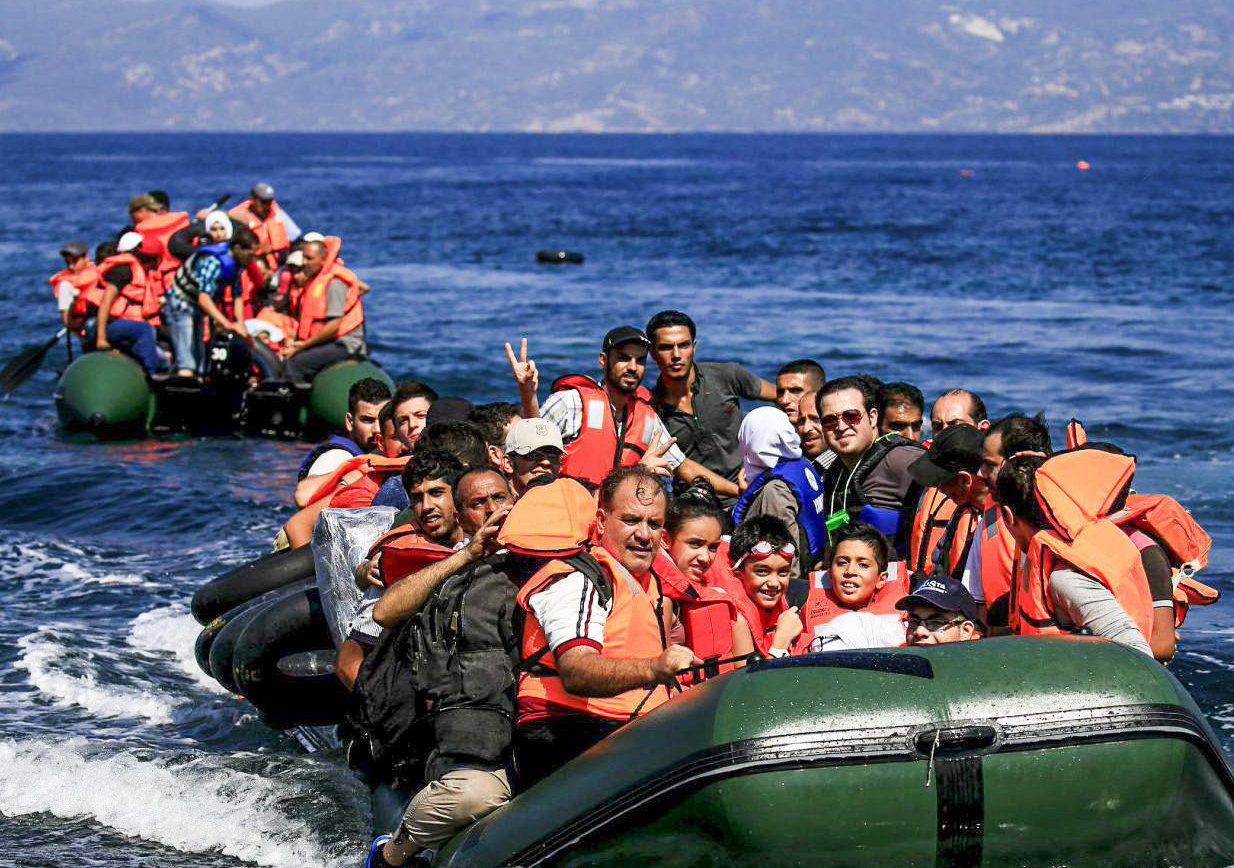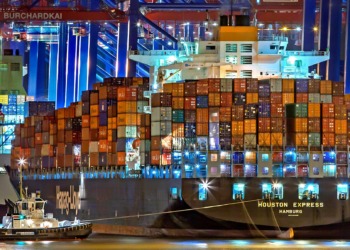70 years after the founding of the United Nations, the world is on the verge of collapsing under its own internal contradictions and under the growing gap between rich and poor; on the refugee issue, the European Union is more at odds with itself than ever; EU member states consistently violate EU law; now, on the 70th anniversary of the United Nations, there is a discernable shift away from international law that calls the very foundations of the European Union into question. After more than 20 years of the EU in its current form, are we at the end of the European idea of a community of nations based on solidarity and social equality?
The establishment of a system of international law is the most important achievement of the post-war period. International law sets human rights and human dignity over national and personal self-interests and obliges us to respond empathetically i.e. to have an understanding of the needs, interests and perspective of others, without necessarily agreeing with them. International law, as we know it today, can only be understood from a historical perspective and history makes clear why we need to preserve and develop it.
The UN Charter, the founding document of the United Nations, was adopted on 26 June 1945. It is the first document in history to condemn the use of military force for the achievement of political ends. This means that any nation that violates this norm is subject to particularly harsh sanctions by the international community. The most important principle of the UN Charter is that nations, without exception, shall not engage in wars of aggression. The UN Charter, signed by 50 nations in San Francisco, California, became effective on 24 October 1945. The experience of both world wars were decisive in the formulation of the universal principles of the Charter. The establishment of world peace and humanity dignity for all are jointly formulated leitmotifs enshrined in the Charter. Securing the peace, fighting life-threatening climate change and implementing sustainable global human rights are the fortified bedrocks of the United Nations. Today, 193 countries are members of the United Nations. 1
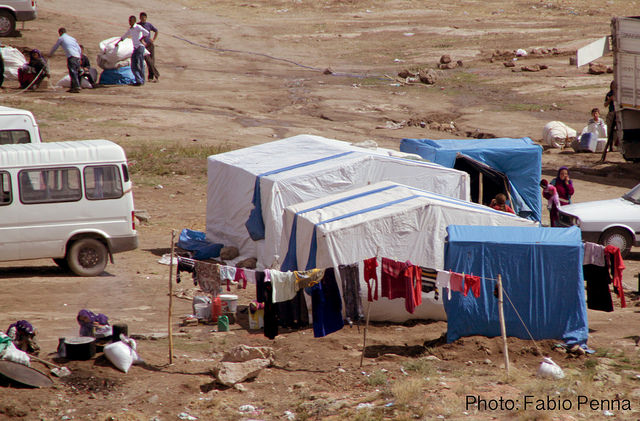 In the Photo: Syrian refugee camp in Cappadocia, Turkey.
In the Photo: Syrian refugee camp in Cappadocia, Turkey.
Sadly, the annual General Assembly of the United Nations, which provides member states a forum for dialogue and exchange, has not resulted in a more peaceful world. On the contrary, today we see a proliferation of local and regional conflicts. In 2015 there are presently 21 wars, 25 local conflicts and nearly 180 violent conflicts. According to the Heidelberg Institute for International Conflict Research, there are currently a total of 424 political conflicts worldwide.2 This is the largest number of recorded world conflicts since the founding of the Institute in the 1990s.
The decisive difference to earlier times, however, is that—notwithstanding the criticism often directed at the UN— the international community has succeeded in establishing a binding set of rules that defines how to proceed in cases of large-scale migration. The dramatic events of WWII and the mass migration of refugees during and subsequent to the War made clear the need for a binding set of rules for dealing with the mass exodus of migrants. Although the League of Nations had considered this issue in the early twentieth century, it was not until 28 July 1951 with the adoption of the Geneva Convention on Refugees (GCR) that refugees were granted internationally binding legal protection and assistance.3
Germany was among the first six countries to ratify the Convention, making the agreement a reality. Today 148 countries have ratified the Geneva Convention on Refugees. A logical consequence of this fact for the current refugee crisis would be the following: instead of stretching individual countries like Sweden to their limits— and despite their efforts, thousands of refugees are left behind — each country that has ratified the GCR would be required to accept and resettle refugees in accord with its means.
………………………………………………………………………………………………………………….
Related Articles: THE DRC- FINDING HOPE AMIDST AFRICA’S WORLD WAR by Chloe Hogg
CAN THE UNITED NATIONS REBUILD MILLENNIAL TRUST? by Deanna Shen
………………………………………………………………………………………………………………….
This would mean that the 148 States would together share in the costs and logistics of handling the refugee problem under the organization and coordination of the United Nations High Commissioner for Refugees (UNHCR), helping to mitigate the problem. Most EU states have thus supposedly already committed themselves to solving the refugee crisis, but hardly anyone has demonstrated the resolve to implement a solution.
Where does this collective amnesia, evidently a European malady, come from?
If we accept the premise that “a promise is a promise” in fair weather or in foul, then the humanitarian crises in Syria, Iraq or Afghanistan can be dealt with. The duty to receive refugees from war zones is de facto a legally binding norm of the Geneva Convention and an obligation of all States that have signed this international agreement. Fortunately, this obligation has, at times, been met: German Chancellor Angela Merkel, for example, has clearly and unambiguously positioned herself as affirming Germany’s commitment to receiving war refugees.
The provisions of the Geneva Convention provide a sound legal framework for the protections afforded to refugees. Both the humanitarian aid and the social legal rights that signatory States should grant migrants, are clearly defined. In addition, there are rules for determining who is entitled to refugee status and who is not. A refugee is a person who “owing to well-founded fear of being persecuted for reasons of race, religion, nationality, membership of a particular social group or political opinion, is outside the country of his nationality and is unable or, owing to such fear, is unwilling to avail himself of the protection of that country; or who, not having a nationality and being outside the country of his former habitual residence as a result of such events, is unable or, owing to such fear, is unwilling to return to it” (1951 Convention Relating to the Status of Refugees). War criminals are excluded.
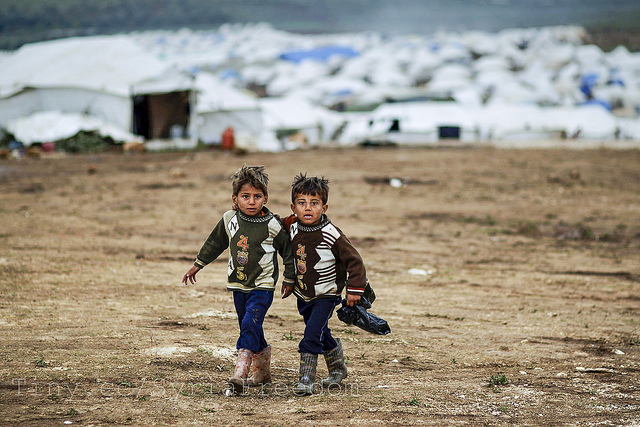 In the Photo: Syrian boys walk to a tent at a refugee camp for displaced Syrians. Photo Credit: Freedom House
In the Photo: Syrian boys walk to a tent at a refugee camp for displaced Syrians. Photo Credit: Freedom House
As the destination for many people on the run, Europe has become synonymous with Bliss island. We should not forget that for most of us who lead a comfortable life on this safe island, the uprooting and serious deprivations of refugees in flight is scarcely imaginable and for that reason, all the more deserving of our understanding. Stefan Zweig, who in 1941, at the end of his escape from Nazi Germany to Petrópolis, Brazil, took his own life, described this feeling of inner conflict perhaps better than anyone else:
Emigration in itself, whatever the reason, inevitably disturbs the equilibrium. On alien soil one’s self-respect tends to diminish, likewise self-assurance and self-confidence; but this cannot be understood until it has been experienced. I have no compunction about admitting that since the day when I had to depend upon identity papers or passports that were indeed alien, I ceased to feel as if I quite belonged to myself. A part of the natural identity with my original and essential ego was destroyed forever. I have developed a reserve that is not consonant with my real disposition and—cosmopolite that I once thought myself—I am possessed by the feeling that I ought express particular gratitude for every breath of air of which I deprive a foreign people. On sober thought I am, of course, aware of the absurdity of such whims, but of what avail reason, against one’s emotion? For all that I had been training my heart for almost half a century to beat as that of a citoyen du monde it was useless. On the day I lost my passport I discovered, at the age of fifty-eight, that losing one’s native land implies more than parting with a circumscribed area of soil.4
We can at most imagine how dramatic and depressing it is to leave one’s home without the promise of a safe destination. The effects of migration have long reached Europe and Germany. The almost unbearable scenes that we observed on a daily basis have resulted in different reactions. In addition to feelings of helplessness and empathy, fears of foreign infiltration and loss of prosperity are increasing. In this respect, it is good to see that a “culture of welcoming” has become part of German reality. Nevertheless, the growing number of refuges and asylum seekers in Germany has led to jingoistic remarks that employ a rhetoric reminiscent of the darkest chapters of German and European history. This is worrying. Such right-wing populist tirades must not succeed in overturning democratic values and empathy for the plight of others.
Europe is Drifting Apart
While in Europe billions in aid were made available within no time to rescue the banks, the refugee crisis has called into question the very foundations of the European Union.
The closure of the Hungarian border on 16 October 2015 can only be described as shameful and is a bitter indictment of European unity. The fact that peace within the European Union has reigned for decades is conceivable only as a result of the strong cooperation and cohesion of Member States and the creation of a single European market. Against this background, it is hard to fathom that on the issue of refugees the Hungarian Prime Minister Viktor Orbán has consistently violated European law and actually succeeded in erecting a border fence with Hungary’s neighbours to keep out migrants.
Closing the borders essentially means adopting the idea that we can confidently close our eyes to the current crisis. Declaring the crossing of the border into Hungary a criminal offense and thus imprisoning and criminalizing more than 800 war refugees, is not only a scandal, but a declaration of war on the value system of the European Union. This explicit disregard for the UN Charter and the Geneva Convention and is a clear breech of EU law and international agreements. One can break out in a cold sweat when one considers how this course is reminiscent of the situation of the 1920s. Incendiary leaders like Orbán threaten to topple humanitarian principles as well as political stability. Such positions have, in the past, been the starting point for two world wars.
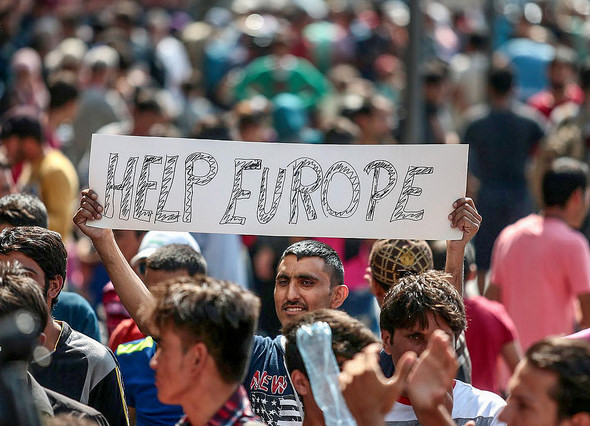 In the Photo: A man holds a sign as refugees demand to enter Germany. Photo Credit: Freedom House
In the Photo: A man holds a sign as refugees demand to enter Germany. Photo Credit: Freedom House
In the margins of the European summit crisis on 25 October 2015, Viktor Orbán declared himself to be only an observer and thus no longer responsible for the refugee crisis. Despite the lack of solidarity from Hungary, the EU seems to have taken joint action. In a dramatic appeal before the EU meeting to the Organisation for Security and Cooperation in Europe (OSCE), António Guterres, UN High Commissioner for Refugees, called for immediate measures by the EU to support UN aid for refugees in order to alleviate the suffering of migrants, highlighting the urgent need for joint action. In his address, he pointed out that in many countries, political uncertainty and the dissolution of traditional structures of power has led to an escalation of conflict. These chaotic conditions have immensely accelerated the increase in migration movements. Today, about 80% of refugees arrive from war zones. In 2011 that figure was 14,000. In 2013, the number rose to 32,000. In 2014, the number of war refugees reached a staggering 42,500 per day.
In view of these figures, the scope of application of the Geneva Convention cannot be overestimated. The UNHCR has unambiguously highlighted the fundamental importance of the Convention and described a key provision as follows:
There is no doubt that people, who as a consequence of war or conflict are persecuted or threatened with persecution, should fundamentally be seen as refugees under the terms of the 1951 Geneva Convention and the 1967 Protocol. In cases of the mass influx of migrants it can be difficult to process every single application for asylum according to the procedures laid out by the Convention and Protocol. As a result, in the case of large waves of migrants and refugees, the practice has emerged, under certain circumstances, of regarding individual members of the group as refugees, or of adopting a so-called prima facie or group-status determination.5
This means there is a usable, legal framework for a general recognition of the right to asylum on behalf of refugees and migrants, without having to examine every application individually.
The acceleration of asylum procedures and a quick integration of those who fall within the scope of protections afforded by the Geneva Convention are centrally important so as not to increase the level of suffering. Every year approximately 615,000 people cross the Mediterranean, of whom about 475,000 cross the eastern Mediterranean into Greece. Of those who cross the eastern Mediterranean, 80% come from war zones in Syria, Iraq or Afghanistan. These refugees all fall under the scope of application of the Geneva Convention and therefore—to emphasize the point again— have the right to protection and assistance.
This situation poses a major challenge. Most of the migrants seek refuge in Lebanon, Turkey and Jordan. These countries, each of which have taken in over a million refugees from Syria, face much greater problems than the European Union, which, with its 500 million inhabitants and enormous economic output is certainly much better positioned to offer assistance. The number of refugees who will reach Germany this year is estimated to be 800,000 people. Of these only about 400,000 will be allowed to stay in the country. The remainder will be deported.
With collective, decisive action the EU would readily be able to cope with the refugee crisis. Even if the scale of the current refugee crisis overwhelms us, we should adhere to the idea of solidarity, in order to avoid further scenes like those we have witnessed in Greece or Slovenia, by which we allow human degradation to continue unabated. We must stand together and appeal to the conscience of each and every European to contribute to solving this problem.
Footnotes:
1 Charta der Vereinten Nationen und Statut des Internationalen Gerichthofs. [The UN Charter and Statue of the International Court of Justice] Ed. Deutsche Gesellschaft für die Deutschen Nationen e.V. URL:http://www.dgvn.de/fileadmin/user_upload/DOKUMENTE/UN_Diverse/Charta_Vereinte_Nationen_UN.pdf [30.10.2015]
2 Heidelberg Institute for International Conflict Research: Conflict Barometer. 2014. URL:http://www.hiik.de/de/konfliktbarometer/pdf/ConflictBarometer_2014.pdf [30.10.2015]
3 UNHCR. The UN Refugee Agency: Genfer Flüchtlingskonvention. [The 1951 Convention Relating to the Status of Refugees] URL:http//www.unher.de/mandat/genferfluechtlingskonvention.html [30.10.2015]
4 Stefan Zweig: Die Welt von Gestern. Errinerungen eines Europäers. [The World of Yesterday. Rememberances of a European] Frankfurt am Main: S. Fischer Verlag, 2014, p. 465f.
5 UNHCR. The UN Refugee Agency: Organisation for Security and Cooperation in Europe (OSCE). Conference on Common Security in the Mediterranean Region: Challenges and Opportunities. Remarks by António Guterres, UN High Commissioner for Refugees (transcript). Dead Sea, Jordan. 20 October 2015. URL:http://www.unhcr.org/5627a1d39.html [30.10.2015]


